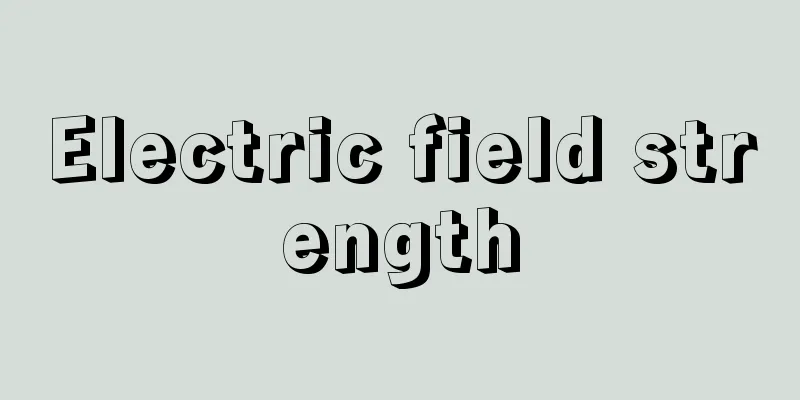Electric field strength

|
When an electric charge is placed between two flat conductors (capacitors) that have a voltage applied to them, an electric force acts on the charge. The electric field is the area in which the force acts on the charge, and the strength of this force is called the electric field strength. On the other hand, for radio waves, in which mutually perpendicular electric and magnetic fields propagate through space, in addition to electric field intensity (unit: volts per meter, V/m), which expresses the strength (amplitude of the wave) in terms of the electric field, magnetic field intensity (unit: amperes per meter, A/m), which expresses the strength in terms of the magnetic field, or power flux density (unit: watts per square meter, W/ m2 ), which expresses the power passing through a unit area, are used. The electric field strength of radio waves emitted from an antenna decreases inversely proportional to the distance. If the power radiated from an isotropic antenna (a hypothetical lossless antenna that radiates power uniformly in all directions) is P (W), the electric field strength E (V/m) at a point d (m) away from the antenna is expressed by the following formula:
Generally, the electric field strength of radio waves received as broadcasts is weak, so the units of electric field strength are millivolts per meter (mV/m, one thousandth of a volt per meter) or microvolts per meter (μV/m, one thousandth of a millivolt per meter). To receive good quality radio waves, a field strength of at least about 250 microvolts per meter is required for medium wave sound broadcasting, and at least about 500 microvolts per meter for standard television broadcasting. [Noboru Wakai] Source: Shogakukan Encyclopedia Nipponica About Encyclopedia Nipponica Information | Legend |
|
電圧のかかっている2枚の平板導体(コンデンサー)の間に電荷を入れると、その電荷には電気的な力が働く。電界とは、その電荷に力が働く領域をいい、その力の強さを電界強度という。 一方、互いに直交する電界と磁界が空間を伝わる電波に関しては、その強さ(波動の振幅)を電界によって表す電界強度(単位はボルト毎メートル、V/m)のほかに、磁界によって表す磁界強度(単位はアンペア毎メートル、A/m)、または単位面積を通過する電力によって表す電力束密度(単位はワット毎平方メートル、W/m2)が用いられる。 アンテナから放射された電波の電界強度は、距離に反比例して減少する。等方性アンテナ(全方向に均一に電力を放射する仮想の無損失アンテナ)から放射される電力をP(W)とすると、アンテナからd(m)離れた点における電界強度E(V/m)は次式で表される。
一般に放送として受信されるときの電波の電界強度は弱いので、電界強度の単位として、ミリボルト毎メートル(mV/m、ボルト毎メートルの1000分の1)またはマイクロボルト毎メートル(μV/m、ミリボルト毎メートルの1000分の1)が用いられる。良質な電波の受信には、中波の音声放送では約250マイクロボルト毎メートル以上の電界強度が、また標準テレビジョン放送では約500マイクロボルト毎メートル以上の電界強度が必要である。 [若井 登] 出典 小学館 日本大百科全書(ニッポニカ)日本大百科全書(ニッポニカ)について 情報 | 凡例 |
<<: Electrolytic polishing - Denkaikenma
Recommend
Meeting - Giso
This position was once placed in the Imperial Cou...
Mannoike Pond
This reservoir is located in Mannou Town, Nakatad...
Transvestite
...Homosexuality, which can be defined as sexual ...
Diaphragm - Diaphragm
The human diaphragm is a plate-like septum compos...
Pycnometer; specific-gravity bottle
A type of hydrometer. Also called a pycnometer. A ...
Literary painting
Literati are paintings that were created by intel...
Abhramū (English spelling)
...The first male born was called Airāvata, and i...
advocacy ad (English spelling) advocacyad
...Since the late 1970s, in addition to governmen...
Acanthus spinosus (English spelling) Acanthusspinosus
…[Hiroshi Aramata]. … *Some of the terminology ex...
Horror
…The armory (4th century BC) built by the archite...
Protopterus aethiopicus (English spelling) Protopterusaethiopicus
…Lungfish [Hibiya Kyo]. . . *Some of the terminol...
Aschizomys regulus (English spelling)
…[Tadaaki Imaizumi] [Yoshinori Imaizumi]. … *Some...
Great Slave Lake
A huge lake in the southern part of the Northwest ...
Schistosoma haematobium
…Japanese avian encephalopathy [Shomei Kojima]. …...
《Memorial Days》
...This ambitious work attempts to put into words...









